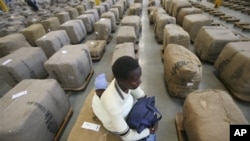Delegates from 171 countries and several hundred civic groups are meeting next week in Uruguay to discuss ways to reduce tobacco consumption around the world. A controversial report published on the eve of the meeting says some of the proposed measures would devastate tobacco growers in several African countries. But the report is coming under heavy fire from anti-tobacco activists.
The report says draft proposals for the Framework Convention on Tobacco Control meeting in Uruguay would seriously affect the lives of nearly four million people who depend on tobacco farming in Malawi, Mozambique, Uganda, Zambia and Zimbabwe.
The report, which was compiled by a South African research organization (NKC), adds that an additional 12 million people in neighboring countries would also be affected by the measures.
The Framework Convention on Tobacco Control (FCTC) is sponsored by the World Health Organization (WHO) and has been ratified by 171 governments. It seeks to reduce the effects of tobacco use through education, advertising bans, package warnings, higher taxes and non-smoking zones.
But the director of the International Tobacco Growers Association, Antonio Abrunhosa, says tobacco farming contributes considerably to export earnings in certain African countries.
"The governments in Africa should be very attentive and everyone who has investments in Africa [and] everyone interested in the development of Africa, because it is by far the area which will be more hit by this," said Abrunhosa.
The Growers Association official said especially damaging would be a proposal to ban certain ingredients traditionally used with the Burley variety of tobacco that is grown extensively in African countries.
Burley tobacco is a high-yield variety that is extensively used in American-style cigarettes that are popular worldwide.
The report says regional economic groups in southern Africa and the Caribbean have expressed concerns about the economic effect of the measures.
But members of the Framework Convention Alliance, whose 350 member groups support the Tobacco Control Convention, say the draft proposal aims to limit additives - such as chocolate, licorice and sugar - because these aim primarily to attract new, usually young, people to tobacco use.
But the Director of the Tanzania Tobacco Control Forum, Lutgard Kagaruki, said the proposal does not target Burley tobacco itself.
"Restricting flavorings has nothing to do with Burley tobacco," said Kagaruki. "And actually the guidelines do not mention anything about specific types of tobacco."
She notes that several popular brands of American cigarettes still use the Burley variety of tobacco, but without additives and says the Growers Association is looking for a way to defeat the proposed ban.
The report says another proposal would call on governments to consider limiting the amount of land used for tobacco cultivation.
Abranhosa of the Growers Association says this would not work because governments that have not ratified the Convention would increase their production to satisfy demand.
"So this will just impact negatively on the countries which have ratified the FCTC with no impact whatsoever on health," added Abranhosa. "As a matter of fact even the idea that smokers will smoke less if you reduce the production of tobacco is a completely crazy idea. The only thing that will happen is the prices will go up for tobacco."
But Rob Cunningham of the Canadian Cancer Society says there are no proposals before the Convention to restrict the quantity of tobacco grown by countries.
He says tobacco consumption and production is declining in the developed world, but demand in the developing world is increasing because of rising consumption and growing populations.
"Any decrease in smoking that we see in developed countries is being offset by a growth in the developing countries and the worldwide demand for leaf tobacco from farmers is not going down. In fact, it is going up," said Cunningham.
And he says demand is expected to continue to grow for at least 10 years, a projection he says is not mentioned in the report.
Kagaruki of the Tanzania Tobacco Control Forum, says many African tobacco growers continue to live in poverty and the use of wood fires to cure the leaf has contributed to de-forestation in certain areas.
"The change to alternative crops would do [be] a lot better to the environment and to the farmers," Kagaruki noted.
She says some tobacco growing communities in her country have improved living standards by converting to alternative crops such as flowers, vegetables or honeybee raising.
The spokesman for the Framework Convention on Tobacco Control, Tarik Jasarevic, says a working group is studying sustainable alternatives to tobacco growing. And a progress report will be presented at the meeting in Uruguay.
"This progress report basically has in its annex policy options and recommendations to countries to look at it and see what will be the next step in the working group," said Jasarevic.
Cunningham of the Canadian Cancer Society notes that the Tobacco Control Convention has been in force for only five years, but remarkable progress has been made in the effort to reduce tobacco consumption.
"What countries need to do is to have a comprehensive strategy," added Cunningham. "But we're only beginning. We have so much more progress to go. And many developing countries simply need more resources to assist them in their efforts with respect to tobacco control."
Analysts note that governments in developing nations will continue to face pressures to protect jobs and export earnings provided by the tobacco industry. But at the same they will have to shoulder a growing health care burden due to rising consumption of tobacco in their communities.




